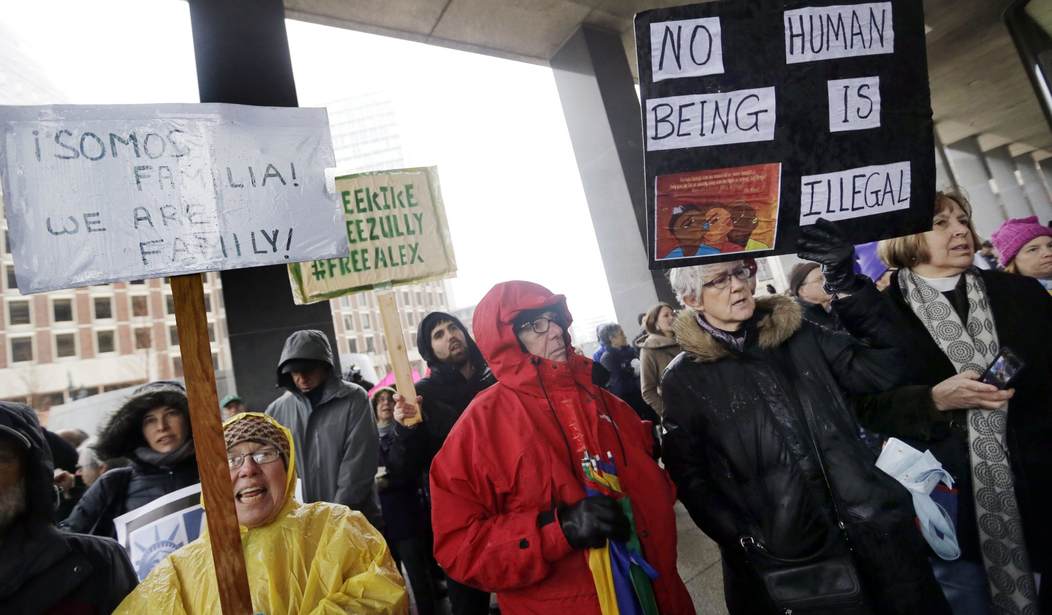Rep. Marc Lombardo (R) posted on Facebook that Massachusetts Secretary of State William Galvin “owes law enforcement an apology” after Galvin compared the Civil War and the effort to end slavery with Massachusetts’ debate over whether the state should be a willing participant in White House immigration policy.
“Slavery was an issue in this country for a long time, and the behavior of some of the ICE officials in catching people is nothing short of the same activity that the slave catchers did,” Galvin said, drawing applause at an Immigrants Day rally April 5.
“Outrageous comparison by Sec. Galvin. Equating enforcement of immigration laws to slave trade is heinous,” Lombardo posted on his Facebook page in response.
Galvin and Lombardo find themselves on opposites sides of the debate over SB 1305 — the Massachusetts Safe Communities Act.
To say Lombardo is 180 degrees away from Galvin on this issue would be an understatement.
The Republican has introduced legislation to increase the penalties on employers who “employ any alien …who has not been admitted to the United States” and to withhold state aid to cities that forbid local police from helping to enforce immigration laws.
Galvin, and those supporting SB 1305, want to keep Massachusetts as far removed as possible from White House’s immigration policy.
Galvin, in fact, during the Immigrants Day rally said the behavior of the Trump administration was “typical of a totalitarian regime.”
Still, Galvin and other supporters of the Safe Communities Act don’t want to call it a “sanctuary state” bill.
Those advocating approval of SB 1305 have stressed the legislation is not intended to stop local cops from sharing information with ICE, nor is it meant to protect criminals from prosecution.
However, it contains provisions that are at least similar to the “sanctuary” status that has been enacted by several communities in Massachusetts.
The Safe Communities Act would ensure state funds are not used to enforce federal immigration laws. The legislation would also stop Massachusetts officials from working with President Trump on the Muslim registry idea that was offered during the president campaign.
“We do not want to utilize the Registry of Motor Vehicles to provide any information to help assist or support any registry that the federal government may be interested in implementing,” Rep. Juana Matias (D), who cosponsored the legislation along with Sen. Jamie Eldridge (D), told WBUR.
Massachusetts Attorney General Maura Healey told the Boston Globe she was not opposed to the idea of Massachusetts becoming a sanctuary state. But the Democrat also said she thought that municipal decisions about cooperating with ICE are best left to local officials “and certainly not the likes of a Donald Trump.”
But Healey’s ambivalence aside, Eldridge and Matias (D) told the Boston Globe they have the support of 92 of their fellow state legislators.
They could also soon be receiving support from outside the legislature.
Northampton, Mass., City Council members will consider a resolution to support the Safe Communities Act and voters in Pelham will vote on whether to voice support for the proposal during their annual Town Meeting on May 6.
“Towns endorsing state policy that might be relevant for municipalities can only help the chance of the bill passing,” Solomon Goldstein-Rose (D) told the Amherst Bulletin. “This wouldn’t prevent ICE from deporting undocumented immigrants, but would make our towns a bit safer and more welcoming.”
Michael Hussin, a Pelham resident, said Healey might want local communities to decide the sanctuary city debate for themselves, but a statewide umbrella policy could shield small towns from reprisals from the Trump administration.
“In helping to protect all its citizens, this act would in effect protect individual cities from being singled out for retribution and bring the weight of our entire delegation into (the) defense of the state,” he said. “For small towns our size, that would be the most effective.”
Eldridge, who has tried several times in the past six years, and failed, to win approval for similar legislation, said he is more optimistic than ever.
Still, Lombardo and those of like mind have hope.
Even though House Speaker Robert DeLeo, through a spokesman, said the bill would be reviewed as it goes through the normal legislative process, he has voiced support for the status quo.
“I think no one knows a city or town better than their local officials, whether it’s a mayor, whether it’s a selectperson or whatever, and I think they along with their council should have the final say in terms of making that decision,” the State House News Service reported DeLeo said on WCVB’s “On the Record.”
Even if SB 1305, which is now before the Joint Committee on Public Safety and Homeland Security, makes it through the House and goes to Gov. Charlie Baker’s desk, its future is uncertain.
Baker (R) has spoken in favor of Massachusetts communities opting to become sanctuary cities but has balked at the idea of taking the concept statewide.
Baker’s spokeswoman, Lizzy Guyton, said in a statement the governor “has and will continue to make Massachusetts a welcoming place full of diverse communities.”
But Guyton also added, “The administration will continue to enforce policies giving the State Police the tools necessary to detain violent criminals or suspected terrorists wanted by federal authorities.”
So, Rep. Matias had to admit during the WBUR interview that even if the Safe Communities Act makes it through the Massachusetts Legislature, there is a chance that Gov. Baker will veto it.
But she said at least the ball will be in Baker’s court.
“We need to bring this issue to the floor, allow our members to vote on this matter,” Matias said, “then bring it before him so that he can then decide if he wants to veto it or not.”









Join the conversation as a VIP Member